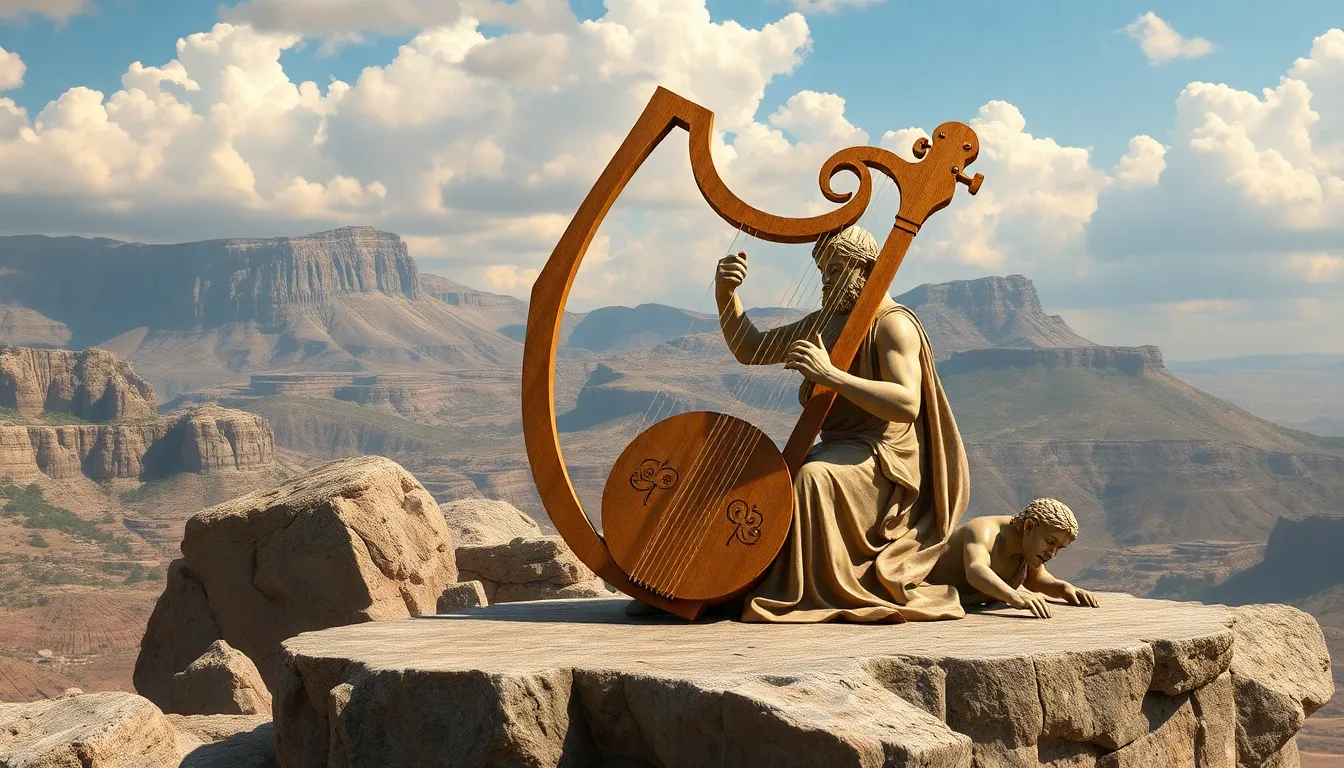The Music of Orpheus: How a Lyre Changed the Course of Mythology
Introduction
In the rich tapestry of Greek mythology, few figures are as enchanting and tragic as Orpheus. Renowned as the quintessential musician and poet, Orpheus’s story is a poignant exploration of love, loss, and the transformative power of music. Central to his legend is the lyre, a stringed instrument that not only symbolizes his artistic prowess but also serves as a conduit for the divine. This article delves into the myth of Orpheus, the role of his lyre, and the lasting impact of his music across cultures and generations.
The Myth of Orpheus: A Brief Overview
The tale of Orpheus is one of the most celebrated narratives in Greek mythology. Orpheus was the son of Apollo, the god of music, and the muse Calliope. Gifted with extraordinary musical talent, he could enchant all living beings and even inanimate objects with his lyre.
Orpheus fell deeply in love with Eurydice, a beautiful nymph. However, their happiness was short-lived when Eurydice was tragically bitten by a snake and succumbed to death. Heartbroken, Orpheus embarked on a daring journey to the Underworld, determined to bring his beloved back to the realm of the living.
In the Underworld, Orpheus encountered Hades, the god of the dead, and his wife Persephone. Using the power of his music, he played a sorrowful tune that moved the hearts of the rulers of the Underworld. They agreed to let Eurydice return to the living world, but with one condition: Orpheus must not look back at her until they had both reached the surface.
In a moment of doubt, Orpheus turned to see if Eurydice was following him, and she was immediately pulled back into the shadows of the Underworld, leaving him devastated. This tragic conclusion emphasizes the fragility of love and the power of trust.
The Role of the Lyre in Orpheus’s Journey
The lyre is more than just an instrument in Orpheus’s story; it is a symbol of his identity and the essence of his artistry. Crafted by Hermes, the lyre was imbued with divine qualities that allowed Orpheus to create melodies that could charm all beings. Throughout his journey, the lyre played a crucial role:
- Calming the Furies: Orpheus’s music soothed the spirits of the Underworld, allowing him safe passage.
- Winning Over Hades: His enchanting melodies resonated with the emotions of Hades and Persephone, ultimately persuading them to grant him a favor.
- A Symbol of Hope: The lyre represented Orpheus’s unwavering hope and love for Eurydice, driving him to defy the natural order.
The Power of Music in Mythology
In Greek mythology, music often serves as a transformative force, capable of influencing gods and mortals alike. Orpheus is not alone in his musical prowess; other mythological figures wielded music as a powerful tool:
- Apollo: As the god of music, Apollo used his lyre to heal, inspire, and bring harmony.
- Hermes: Known for his cunning, Hermes created the lyre and used it to charm and navigate through challenges.
- Siren Songs: The Sirens used their mesmerizing voices to lure sailors to their doom, illustrating the dual nature of music as both beautiful and dangerous.
These examples highlight the significance of music as a bridge between realms, a tool for persuasion, and a means of emotional expression in mythological narratives.
Cultural Impact of Orpheus and His Lyre
The myth of Orpheus has left an indelible mark on ancient Greek culture, influencing not only literature but also visual arts and philosophy. The lyre emerged as a potent symbol of:
- Poetic Inspiration: Poets and artists have long associated the lyre with divine inspiration, linking it to the muses.
- Artistic Expression: Orpheus’s journey represents the artist’s struggle to convey emotion and connect with others.
- Love and Loss: The tragic love story underscores the themes of longing and the human experience of grief.
Literary and Artistic Representations of Orpheus
Throughout history, the Orpheus myth has inspired countless artists and writers. Significant works include:
- Ovid’s “Metamorphoses”: This epic poem recounts the story of Orpheus and Eurydice, emphasizing themes of love and transformation.
- Rainer Maria Rilke’s “Orpheus. Eurydice. Hermes”: Rilke explores the emotional depth of Orpheus’s journey, encapsulating the struggle between love and loss.
- Visual Arts: Artists like Gustave Moreau and Henri Matisse have depicted Orpheus in various forms, often highlighting the beauty and tragedy of his story.
These interpretations reflect the timeless nature of Orpheus’s music and its ability to evoke deep emotions across different mediums.
Modern Interpretations and Adaptations
In contemporary culture, the story of Orpheus continues to resonate, leading to various adaptations in film, theater, and music:
- Film Adaptations: Movies like “Black Orpheus” reinterpret the myth in modern settings, exploring themes of love and fate.
- Musicals: Works such as “Hadestown” blend jazz and folk influences to retell the Orpheus and Eurydice story, emphasizing its relevance today.
- Music: Artists across genres have drawn inspiration from Orpheus, using his story to explore themes of romance and longing in their lyrics.
The adaptability of the Orpheus myth speaks to its universal themes, making it a poignant source of inspiration for creators across generations.
Conclusion: The Lasting Legacy of Orpheus’s Music
The story of Orpheus and his lyre remains a powerful narrative that captures the essence of creativity, love, and the human experience. Orpheus’s journey teaches us about the fragility of life and the enduring nature of love, while the lyre symbolizes the transformative power of music. As we reflect on the legacy of Orpheus, we recognize that his music transcends time, continuing to inspire artists and audiences alike.
In a world where the struggles of love and loss are universal, the tale of Orpheus serves as a reminder of the beauty found in connection and the profound impact of art on the human soul.




